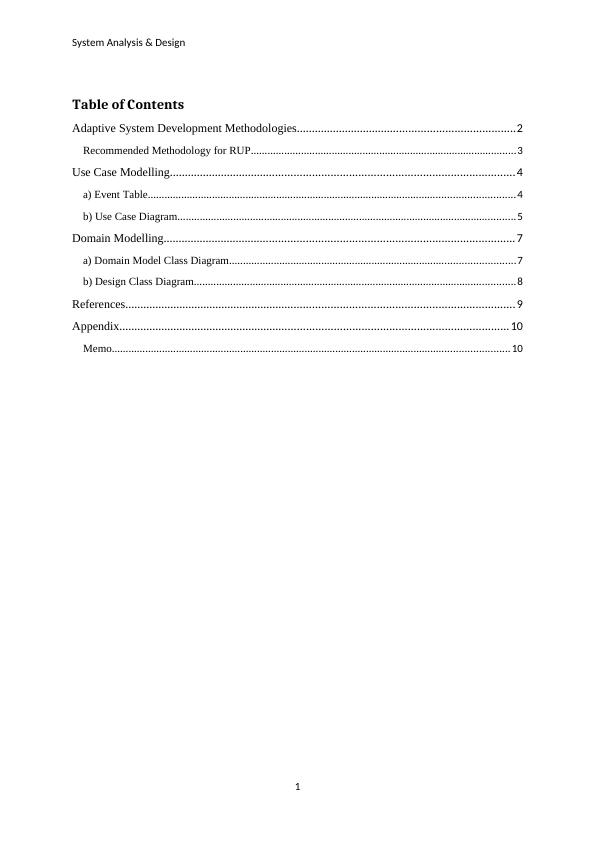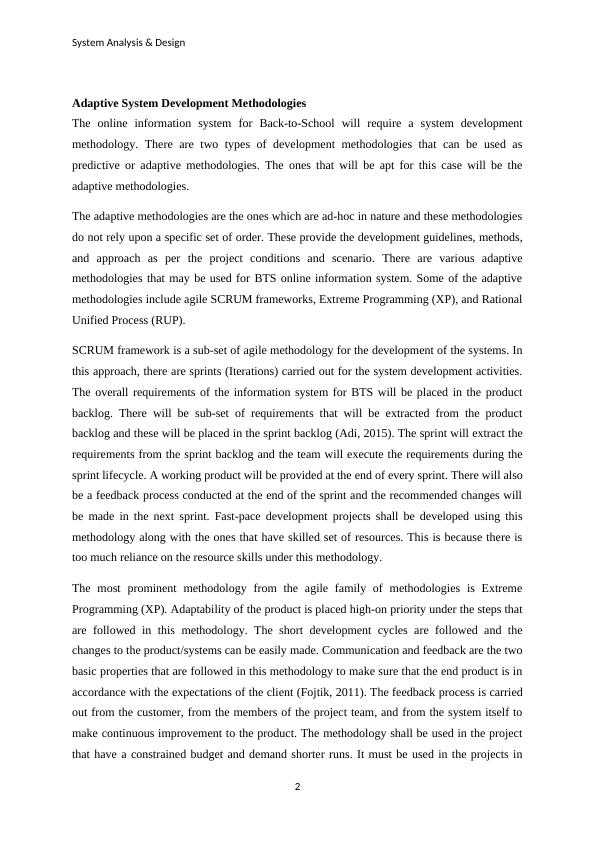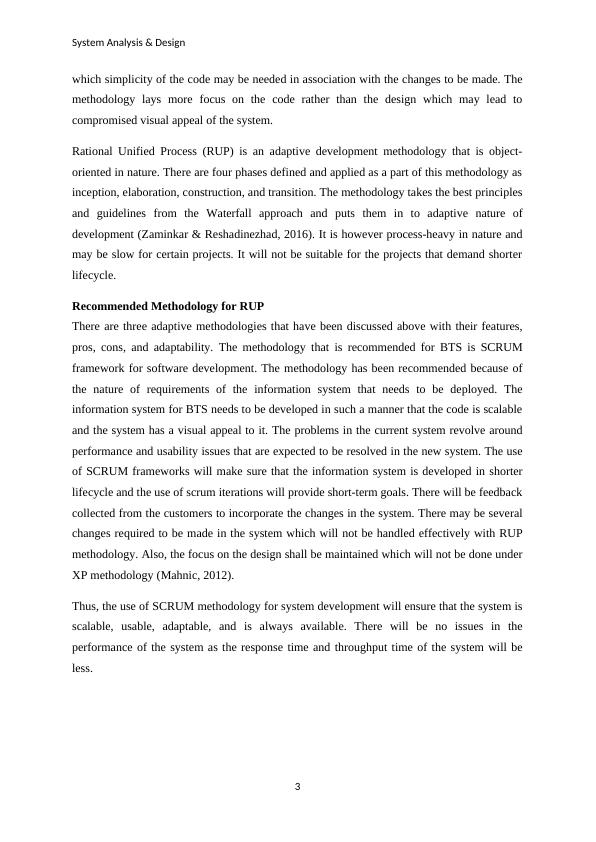Adaptive System Development Methodologies, Use Case Modelling, Domain Modelling
Added on 2023-06-03
14 Pages2088 Words53 Views
[NAME]

System Analysis & Design
Table of Contents
Adaptive System Development Methodologies........................................................................2
Recommended Methodology for RUP...............................................................................................3
Use Case Modelling................................................................................................................. 4
a) Event Table...................................................................................................................................4
b) Use Case Diagram.........................................................................................................................5
Domain Modelling................................................................................................................... 7
a) Domain Model Class Diagram......................................................................................................7
b) Design Class Diagram...................................................................................................................8
References................................................................................................................................ 9
Appendix................................................................................................................................ 10
Memo..............................................................................................................................................10
1
Table of Contents
Adaptive System Development Methodologies........................................................................2
Recommended Methodology for RUP...............................................................................................3
Use Case Modelling................................................................................................................. 4
a) Event Table...................................................................................................................................4
b) Use Case Diagram.........................................................................................................................5
Domain Modelling................................................................................................................... 7
a) Domain Model Class Diagram......................................................................................................7
b) Design Class Diagram...................................................................................................................8
References................................................................................................................................ 9
Appendix................................................................................................................................ 10
Memo..............................................................................................................................................10
1

System Analysis & Design
Adaptive System Development Methodologies
The online information system for Back-to-School will require a system development
methodology. There are two types of development methodologies that can be used as
predictive or adaptive methodologies. The ones that will be apt for this case will be the
adaptive methodologies.
The adaptive methodologies are the ones which are ad-hoc in nature and these methodologies
do not rely upon a specific set of order. These provide the development guidelines, methods,
and approach as per the project conditions and scenario. There are various adaptive
methodologies that may be used for BTS online information system. Some of the adaptive
methodologies include agile SCRUM frameworks, Extreme Programming (XP), and Rational
Unified Process (RUP).
SCRUM framework is a sub-set of agile methodology for the development of the systems. In
this approach, there are sprints (Iterations) carried out for the system development activities.
The overall requirements of the information system for BTS will be placed in the product
backlog. There will be sub-set of requirements that will be extracted from the product
backlog and these will be placed in the sprint backlog (Adi, 2015). The sprint will extract the
requirements from the sprint backlog and the team will execute the requirements during the
sprint lifecycle. A working product will be provided at the end of every sprint. There will also
be a feedback process conducted at the end of the sprint and the recommended changes will
be made in the next sprint. Fast-pace development projects shall be developed using this
methodology along with the ones that have skilled set of resources. This is because there is
too much reliance on the resource skills under this methodology.
The most prominent methodology from the agile family of methodologies is Extreme
Programming (XP). Adaptability of the product is placed high-on priority under the steps that
are followed in this methodology. The short development cycles are followed and the
changes to the product/systems can be easily made. Communication and feedback are the two
basic properties that are followed in this methodology to make sure that the end product is in
accordance with the expectations of the client (Fojtik, 2011). The feedback process is carried
out from the customer, from the members of the project team, and from the system itself to
make continuous improvement to the product. The methodology shall be used in the project
that have a constrained budget and demand shorter runs. It must be used in the projects in
2
Adaptive System Development Methodologies
The online information system for Back-to-School will require a system development
methodology. There are two types of development methodologies that can be used as
predictive or adaptive methodologies. The ones that will be apt for this case will be the
adaptive methodologies.
The adaptive methodologies are the ones which are ad-hoc in nature and these methodologies
do not rely upon a specific set of order. These provide the development guidelines, methods,
and approach as per the project conditions and scenario. There are various adaptive
methodologies that may be used for BTS online information system. Some of the adaptive
methodologies include agile SCRUM frameworks, Extreme Programming (XP), and Rational
Unified Process (RUP).
SCRUM framework is a sub-set of agile methodology for the development of the systems. In
this approach, there are sprints (Iterations) carried out for the system development activities.
The overall requirements of the information system for BTS will be placed in the product
backlog. There will be sub-set of requirements that will be extracted from the product
backlog and these will be placed in the sprint backlog (Adi, 2015). The sprint will extract the
requirements from the sprint backlog and the team will execute the requirements during the
sprint lifecycle. A working product will be provided at the end of every sprint. There will also
be a feedback process conducted at the end of the sprint and the recommended changes will
be made in the next sprint. Fast-pace development projects shall be developed using this
methodology along with the ones that have skilled set of resources. This is because there is
too much reliance on the resource skills under this methodology.
The most prominent methodology from the agile family of methodologies is Extreme
Programming (XP). Adaptability of the product is placed high-on priority under the steps that
are followed in this methodology. The short development cycles are followed and the
changes to the product/systems can be easily made. Communication and feedback are the two
basic properties that are followed in this methodology to make sure that the end product is in
accordance with the expectations of the client (Fojtik, 2011). The feedback process is carried
out from the customer, from the members of the project team, and from the system itself to
make continuous improvement to the product. The methodology shall be used in the project
that have a constrained budget and demand shorter runs. It must be used in the projects in
2

System Analysis & Design
which simplicity of the code may be needed in association with the changes to be made. The
methodology lays more focus on the code rather than the design which may lead to
compromised visual appeal of the system.
Rational Unified Process (RUP) is an adaptive development methodology that is object-
oriented in nature. There are four phases defined and applied as a part of this methodology as
inception, elaboration, construction, and transition. The methodology takes the best principles
and guidelines from the Waterfall approach and puts them in to adaptive nature of
development (Zaminkar & Reshadinezhad, 2016). It is however process-heavy in nature and
may be slow for certain projects. It will not be suitable for the projects that demand shorter
lifecycle.
Recommended Methodology for RUP
There are three adaptive methodologies that have been discussed above with their features,
pros, cons, and adaptability. The methodology that is recommended for BTS is SCRUM
framework for software development. The methodology has been recommended because of
the nature of requirements of the information system that needs to be deployed. The
information system for BTS needs to be developed in such a manner that the code is scalable
and the system has a visual appeal to it. The problems in the current system revolve around
performance and usability issues that are expected to be resolved in the new system. The use
of SCRUM frameworks will make sure that the information system is developed in shorter
lifecycle and the use of scrum iterations will provide short-term goals. There will be feedback
collected from the customers to incorporate the changes in the system. There may be several
changes required to be made in the system which will not be handled effectively with RUP
methodology. Also, the focus on the design shall be maintained which will not be done under
XP methodology (Mahnic, 2012).
Thus, the use of SCRUM methodology for system development will ensure that the system is
scalable, usable, adaptable, and is always available. There will be no issues in the
performance of the system as the response time and throughput time of the system will be
less.
3
which simplicity of the code may be needed in association with the changes to be made. The
methodology lays more focus on the code rather than the design which may lead to
compromised visual appeal of the system.
Rational Unified Process (RUP) is an adaptive development methodology that is object-
oriented in nature. There are four phases defined and applied as a part of this methodology as
inception, elaboration, construction, and transition. The methodology takes the best principles
and guidelines from the Waterfall approach and puts them in to adaptive nature of
development (Zaminkar & Reshadinezhad, 2016). It is however process-heavy in nature and
may be slow for certain projects. It will not be suitable for the projects that demand shorter
lifecycle.
Recommended Methodology for RUP
There are three adaptive methodologies that have been discussed above with their features,
pros, cons, and adaptability. The methodology that is recommended for BTS is SCRUM
framework for software development. The methodology has been recommended because of
the nature of requirements of the information system that needs to be deployed. The
information system for BTS needs to be developed in such a manner that the code is scalable
and the system has a visual appeal to it. The problems in the current system revolve around
performance and usability issues that are expected to be resolved in the new system. The use
of SCRUM frameworks will make sure that the information system is developed in shorter
lifecycle and the use of scrum iterations will provide short-term goals. There will be feedback
collected from the customers to incorporate the changes in the system. There may be several
changes required to be made in the system which will not be handled effectively with RUP
methodology. Also, the focus on the design shall be maintained which will not be done under
XP methodology (Mahnic, 2012).
Thus, the use of SCRUM methodology for system development will ensure that the system is
scalable, usable, adaptable, and is always available. There will be no issues in the
performance of the system as the response time and throughput time of the system will be
less.
3

End of preview
Want to access all the pages? Upload your documents or become a member.
Related Documents
Adaptive Methodologies for System Development: A Comparison of Scrum and Extreme Programming (XP)lg...
|15
|2854
|471
System Analysis and Design Assignment Solutionlg...
|13
|3488
|158
Adaptive Methodologies for Odd Jobs Limitedlg...
|16
|3696
|367
System Analysis and Designlg...
|14
|1909
|73
Agile Methodologies for Software Development: A Case Study of Australian Fashion Design Softwarelg...
|18
|2733
|317
Implementing Management Information System in OZESlg...
|16
|2390
|402
